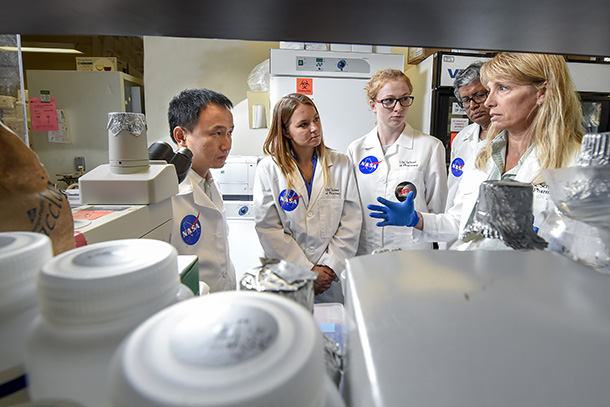Although men often outnumber women in science fields, women comprise the majority of a USC-led team that is the first in the world to seek therapeutic drug discovery from fungi launched into space.
USC School of Pharmacy doctoral students Jillian Romsdahl, 25, and Adriana Blachowicz, 26, were overjoyed to send Aspergillus nidulans to the International Space Station on April 8. They had worked on the Micro-10 experiment in collaboration with NASA’s Jet Propulsion Laboratory for the past two years.
Romsdahl, who grew up near San Francisco, had her pick of graduate schools but ultimately chose USC.
“Although I always thought my graduate research would be exciting, I never imagined it would actually involve sending an experiment into outer space,” Romsdahl said. “It is very exciting to be involved in such groundbreaking science. I don’t think I would have had these opportunities if I had gone anywhere else.”
The Micro-10 team — three women and two men — said fungi produce biologically active compounds called secondary metabolites such as penicillin when put in stressful conditions. Perhaps the microgravity and enhanced radiation environment in space could trigger A.nidulans to produce novel secondary metabolites for use both on Earth and in future NASA expeditions.
“I look forward to analyzing the data once the samples are returned from space,” Romsdahl said.
As for Blachowicz, it’s been quite a trip for a woman originally from a tiny village in Poland and the first in her family to pursue a higher education.
“Three years ago, if anyone told me I would end up working on a NASA mission so early in my career, I would have just laughed out loud,” she said. “I suppose the message is just work hard and believe in your dreams, and maybe one day your dreams will become a reality.”
— Zen Vuong


